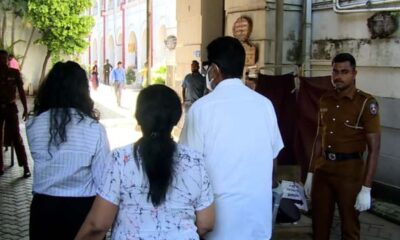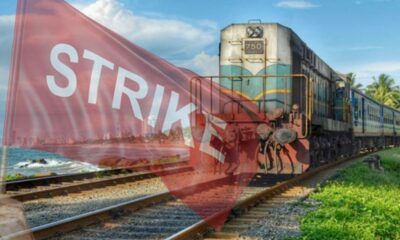FEATURES
Jewels linked to Buddha remains go to auction, sparking ethical debate
Published
2 months agoon
By
editor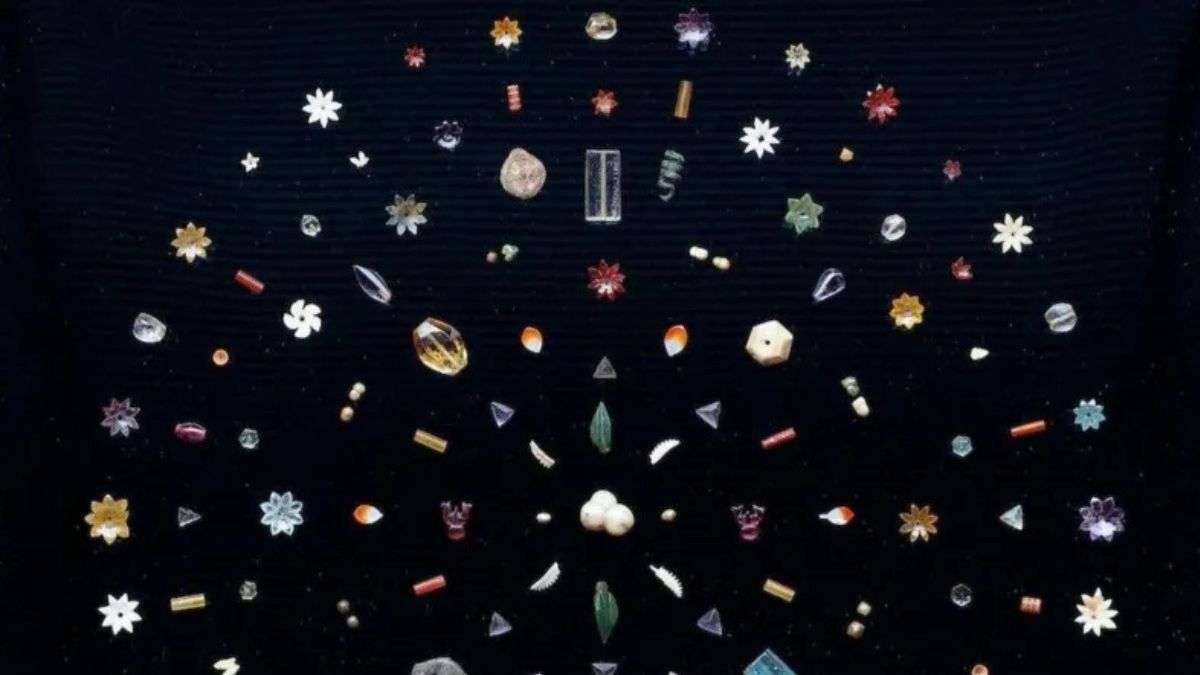
The jewels comprise nearly 1,800 pearls, rubies, sapphires, and patterned gold sheets
On Wednesday, a cache of dazzling jewels linked to the Buddha’s mortal remains, which have been hailed as one of the most astonishing archaeological finds of the modern era, will go under the hammer at Sotheby’s in Hong Kong.
For over a century these relics, unearthed from a dusty mound in northern India in 1898, have sat largely unseen, cradled by a private British collection.
Now, as the gems prepare to leave the custody of their keepers, they are stirring not just collectors’ appetites but also some unease.
They come from a glittering hoard of nearly 1,800 pearls, rubies, topaz, sapphires, and patterned gold sheets, first glimpsed deep inside a brick chamber in present-day Uttar Pradesh in India, near the Buddha’s birthplace.
Their discovery – alongside bone fragments identified by an inscribed urn as belonging to the Buddha himself – reverberated through the world of archaeology. Nicolas Chow, chairman of Sotheby’s Asia and worldwide head of Asian Art, believes this is “among the most extraordinary archaeological discoveries of all time”.
Yet as these relics now face the glare of the auction room, experts tell the BBC that a question hangs heavy: can the sale of treasures so intimately woven into India’s sacred past be considered ethical?

William Claxton Peppé, an English estate manager, excavated the stupa and found the jewels
In 1898, William Claxton Peppé, an English estate manager, excavated a stupa at Piprahwa, just south of Lumbini, where the Buddha is believed to have been born. He uncovered relics inscribed and consecrated nearly 2,000 years ago.
Historians agree these relics, intact until then, are the heritage of both the Buddha’s Sakya clan descendants and Buddhists worldwide. The bone relics have since been distributed to countries such as Thailand, Sri Lanka and Myanmar, where they continue to be venerated.
“Are the relics of the Buddha a commodity that can be treated like a work of art to be sold on the market?” wonders Naman Ahuja, a Delhi-based art historian. “And since they aren’t, how is the seller ethically authorised to auction them?
“Since the seller is termed the ‘custodian’, I would like to ask – custodian on whose behalf? Does custodianship permit them now to sell these relics?”
Chris Peppé, great-grandson of William, told the BBC the family looked into donating the relics, but all options presented problems and an auction seemed the “fairest and most transparent way to transfer these relics to Buddhists”.
Julian King, Sotheby’s international specialist and head of sale, Himalayan Art, New York told the BBC the auction house had made a thorough review of the jewels.
“As is the case with any important items and collectibles that are offered for sale at Sotheby’s, we conducted requisite due diligence, including in relation to authenticity and provenance, legality and other considerations in line with our policies and industry standards for artworks and treasures,” King said.
Ashley Thompson, of Soas University of London, and curator Conan Cheong, both experts in Southeast Asian art, have more questions. In a joint statement they told the BBC: “Other ethical questions raised by the sale are: should human remains be traded? And who gets to decide what are human remains or not? For many Buddhist practitioners around the world, the gems on sale are part and parcel of the bones and ash.”
The sale of the relics has also sparked concern among Buddhist leaders.
“The Buddha teaches us not to take other people’s possessions without permission,” Amal Abeyawardene of London-based British MahaBodhi Society, told the BBC. “Historical records indicate that the Sakyamuni clan were granted custody of these relics, as the Buddha emanated from their community. Their wish was for these relics to be preserved alongside adornments, such as these gems, so that they may be venerated in perpetuity by the Buddha’s followers.”

The jewels were unearthed from this stupa in Piprahwa, northern India in 1898
Chris Peppé has written that the jewels passed from his great-uncle to his cousin, and in 2013 came to him and two other cousins. That’s when he began researching their discovery by his great-grandfather.
The Los Angeles-based television director and film editor wrote he had found 1898 newspaper reports – from Reuters to the New York Tribune – announcing the find of Buddha’s remains.
“The colonisation of India by the British had been a source of some cultural shame for me [and continues to be] but, amidst the treasure hunters who hauled their finds back to England, there had also been people focused on the pursuit of knowledge,” Chris Peppé writes.
He noted his research revealed a lot about his ancestors who he had dismissed as “prejudiced Victorians from a bygone era”.
“I learned that Willie Peppé’s first wife chose to travel around India for her honeymoon and loved the country and its culture. Sadly, she died from an unspecified illness. I learned that my grandmother was outraged at the land laws that applied to Indian women.
“And I learned that the excavation of the stupa was an attempt by Willie Peppé to provide work for his tenant farmers who had fallen victim to the famine of 1897.”

The jewels are considered among the most extraordinary archaeological finds of all time
He writes his great-grandfather’s “technical diagrams of ramps and pulleys suggest that he was also a trained engineer who couldn’t resist a project”.
William Peppé handed the gems, relics and reliquaries to the colonial Indian government: the bone relics went to the Buddhist King of Siam (Rama V). Five relic urns, a stone chest and most other relics were sent to the Indian Museum in Kolkata – then the Imperial Museum of Calcutta.
Only a small “portion of duplicates”, which he was allowed to keep, remained in the Peppé family, he notes. (Sotheby’s notes say Peppé was allowed to keep approximately one-fifth of the discovery.)
Sources told the BBC the auction house considers the “duplicates” to be original items considered surplus to those donated, which the “Indian government permitted Peppé to retain”.
Over the past six years years, the gems have featured in major exhibitions, including one at The Met in 2023. The Peppé family has also launched a website to “share our research”.

Four containers made of steatite (a type of stone) and one made of rock crystal were found inside a sandstone box at the Piprahwa stupa
Some scholars argue Buddha relics should never be treated as market commodities.
“The Sotheby’s auction transforms these highly sacred materials into saleable objects, in continuation of acts of colonial violence which extracted them from a stupa and called them ‘gems’ and ‘objects of interest to Europeans’, creating a false division with the ash and bone fragments they were consecrated with,” say Thompson and Cheong.
Chris Peppé told the BBC that in all the monasteries he had visited “no Buddhists regard these as corporeal relics”.
“A few Buddhist academics at western universities have recently offered a convoluted, fact-defying logic whereby they may be regarded as such. It’s an academic construct that is not shared by Buddhists in general who are familiar with the details of the find,” he said.
Peppé said the family “looked into donation [of the relics] to temples and museums and they all presented different problems on closer scrutiny”.
“An auction seems the fairest and most transparent way to transfer these relics to Buddhists and we are confident that Sotheby’s will achieve that.”
Some also point to The Koh-i-Noor, seized by the British East India Company and now part of the Crown Jewels, with many Indians viewing it as stolen. Should the Buddha’s jewels be next?
“Repatriation, I believe, is seldom necessary,” says Ahuja. “Such rare and sacred relics that are unique and which define a land’s cultural history, however, deserve the government’s exceptional attention.”
– Soutik Biswas
(India correspondent – BBC News)
You may like
-
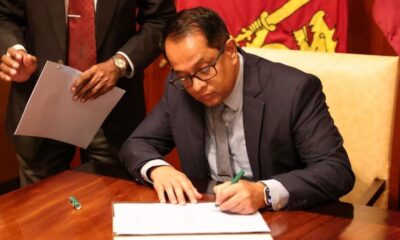

Speaker endorses certificate on NTC (Amendment) Bill
-
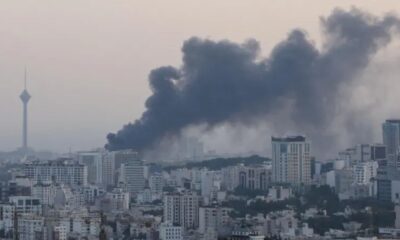

Foreign Ministers of UK, France, Germany & Iran to meet
-


Nearly 2,000 deaths so far due to road accidents in 2025
-
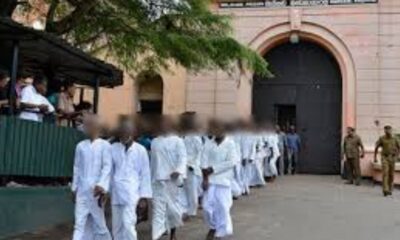

Convicted murderers found to be ‘pardoned’ & released
-
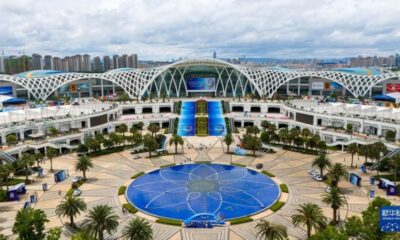

China-South Asia Expo kicks off in Kunming
-


Showers and strong winds expected in several areas today
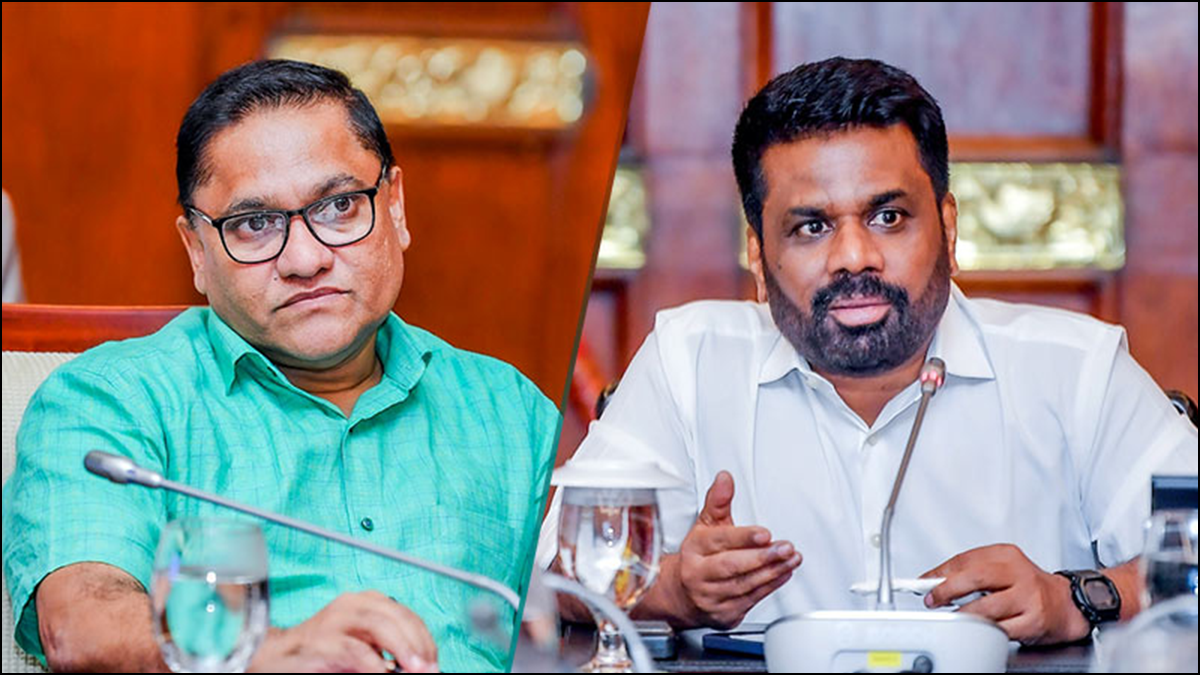
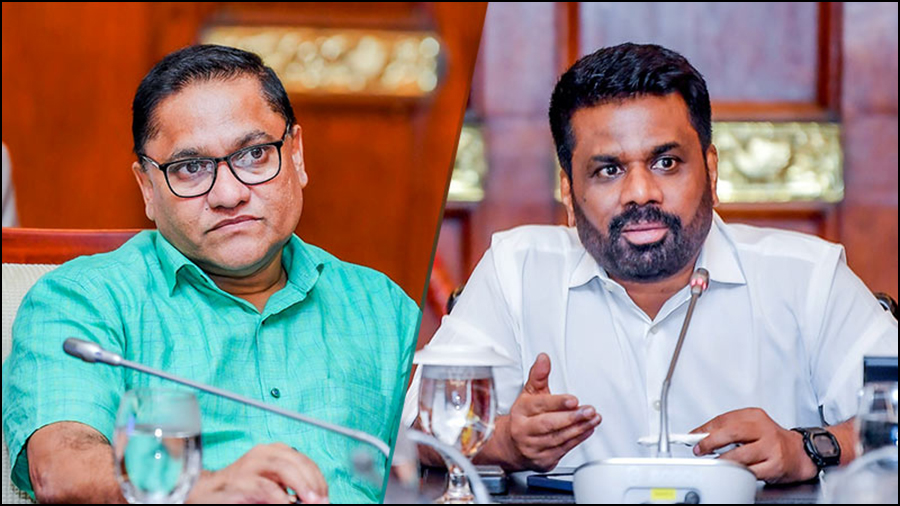
Remember listening to a young lady TV Anchor in a private TV channel a few months ago, demanding from an Opposition MP, what threats he is referring to as “threats to national security”. On her own definition, she was quite certain there are “no threats to national security” as claimed by the Opposition. “Its past midnight when I go home…. after these programmes” she said on camera. “I have never felt any threat to me” she added. The opposition argument was, heavy increase in “shootings” during the past few months in most parts of the country and an increase in deaths due to such shootings, would bring about a threat to “National Security” if not controlled immediately.
But what is “National Security?”
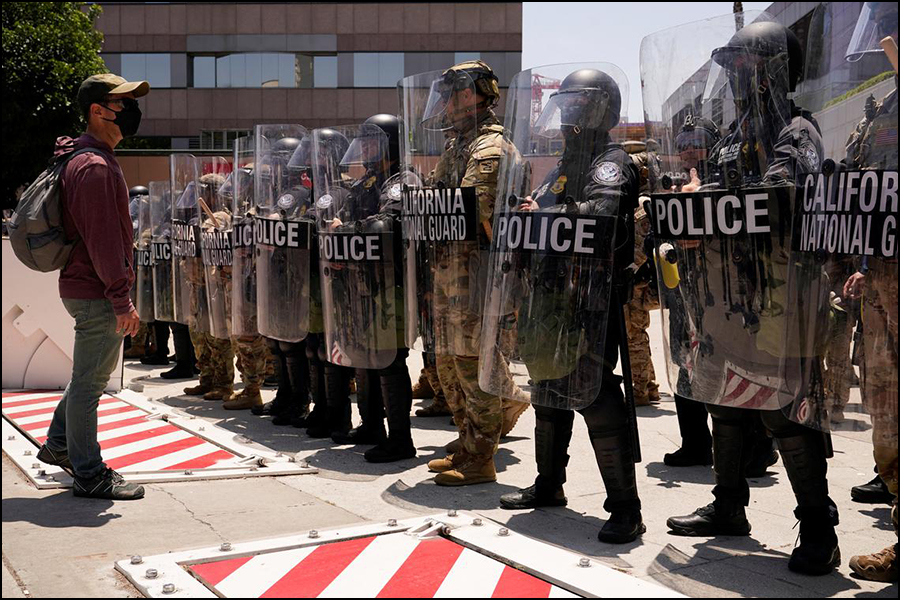
The concept of “national security” evolved over many decades ago with assumed “external threats” to a nation and its people. During the past two plus decades, especially after the New York 9/11 terrorist attack, the concept of national security has been broadened beyond “nations” with intensive intelligence gathering networks. Ethnic and religious conflicts, border clashes and environmental degradation have been added since. The most recent Indo-Pak armed conflict, is one that is spoken of as a “national threat” to India among “Shiv Sena and Hindutva” groups.
We in Sri Lanka, did have remotely manipulated threats to our national security, first in early 1980’s when Indira Gandhi was Prime Minister in neighbouring India. Her perception of Jayawardene presidency as heavily weighted towards US, was what compelled her to intervene in our politics. In his book “Assignment Colombo” the Indian High Commissioner in Colombo J.N. Dixit wrote, “The first step that Mrs. Gandhi took was to give support to Sri Lankan Tamil parties and Tamil militant groups from 1980 onwards, details of which have been mentioned in a number of articles and books over the last 09 years. There is no need for me to repeat them”. (p/15)
As said, details given in many other writings confirm PM Indira Gandhi provided Sri Lankan armed Tamil groups with funds, military training and arms. In 1997, visiting Dehradun that borders Himalayas, I had a wholly unexpected meeting with a social activist very close to the Gandhi family. He took me to the “Rashtriya Indian Military College” in Garhi Cantt, where a select group of LTTE cadres had been trained to use “RPGs” and mortars. I was shown a massive rock in the hills, not too far away from the military college and told, mortars were fired at that rock during training.
Then Tamil Nadu (TN) Chief Minister, Sri Lankan born M.G. Ramachandran, popularly known in Tamil cinema as MGR, provided special accommodation to most Tamil armed group leaders and is said to have funded the LTTE nurturing a special fancy towards Prabhakaran. All that certainly was collective Indian manipulations in undermining our national security.
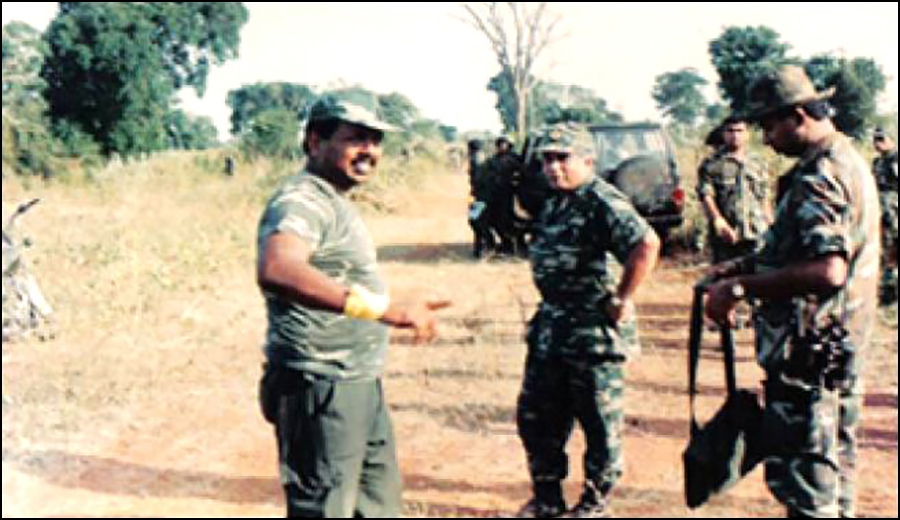
The next came in 1987 June. Then State Minister of Defence Lalith Athulathmudali a hardliner in Indo-Sri Lanka relations, endorsed a military offensive in March 1987 to take over Jaffna peninsula. Towards end May, the state military entered Jaffna peninsula and was pushing the LTTE towards Wadamarachchi. New Delhi hastened to inform the Colombo government, they want the “Wadamarachchi offensive” stopped immediately, to avoid a situation of mass hunger in the peninsula. Food not used as a “weapon of war”, Athulathmudali was determined to take-over whole of Jaffna peninsula in less than 02 weeks and was in no mood to halt the military offensive.
Yet Tamil Nadu convinced PM Rajiv Gandhi to decide on a flotilla of naval boats to deliver food to Jaffna. When Sri Lankan navy stopped them from entering SL waters and forced them to return to Rameswaran on June 03, India had decided on the ill-famed “air drop” on Jaffna, violating Sri Lankan airspace. On 04 June the airdrop of food parcels was carried out with SL High Commissioner in New Delhi Bernard Thilakaratne informed of the air drop about an hour before. Next day the Indian media carried the news of Indian Air force “successfully” completing “Operation Poomalai” by dropping food parcels on Jaffna that brought the Wadamarachchi offensive to a stop.
The last such threat on Sri Lankan national security was when PM Rajiv Gandhi in July 1987 almost coerced President Jayawardene to accept his government’s answer to the Sri Lankan Tamil armed conflict. The Indo-Sri Lanka Accord was signed in Colombo in July 1987 that led to Indian Peace Keeping Forces (IPKF) taking over security of North-East and formation of elected Provincial Councils with devolved power. In Sinhala South, opposing the PCs and the IPKF presence, the JVP unleashed a terror campaign leading to complete mayhem.
All that being history, since President Rajapaksa declared the war as “victoriously concluded” on 19 May, 2009 with the LTTE and its entire leadership eliminated, Modi’s India has become a strong ally of Sri Lanka in its efforts to tide over the recent economic crisis. There remained no other external factor that can be assumed as an imminent threat to Sri Lanka’s national security.
What then is the Opposition assuming as a possible threat to our national security with increased shootings and deaths during the past few months? Unless these underworld groups are bought over by an “external agency” in the future, for now, they are only a threat to social stability and peace, and not “national security”. They act on their own agenda, nevertheless creating an uncertainty about citizen’s safety and security to life. It is therefore about how efficient the government is, in policing society, ensuring law and order for all and one.
NPP Foreign Policy & Genocide
If at all, what could in the future be a threat to our national security is the present NPP government’s pro-US foreign policy that accommodates Israel as a “peaceful” non-aggressive State, ignoring the genocidal war against Palestine. But on the ground, with mass recruitments of Israeli youth for the ongoing military offensives against Palestine since October 2023, Israeli government needs labour for their community based farming and for quick reconstruction of damaged buildings due to Hamas rocket fire.
Since Gotabhaya Rajapaksa as Secretary to the Ministry of Defence opened up links for Sri Lankan migrant employment in Israel, 02 MoUs signed between the two governments have in 2020 provided jobs for home stay female caregivers and again in 2023 for agriculture labour, subsequently extended for construction work as well. This year during the first 03 months, nearly 2,000 Sri Lankans have left to Israel as construction workers. In mid May this year, another 447 Sri Lankans were ready to leave according to Sri Lanka Bureau of Foreign Employment (SLBFE). (https://www.slbfe.lk/slbfe-news/447-sri-lankans-to-begin-employment-in-israels-construction-sector/)
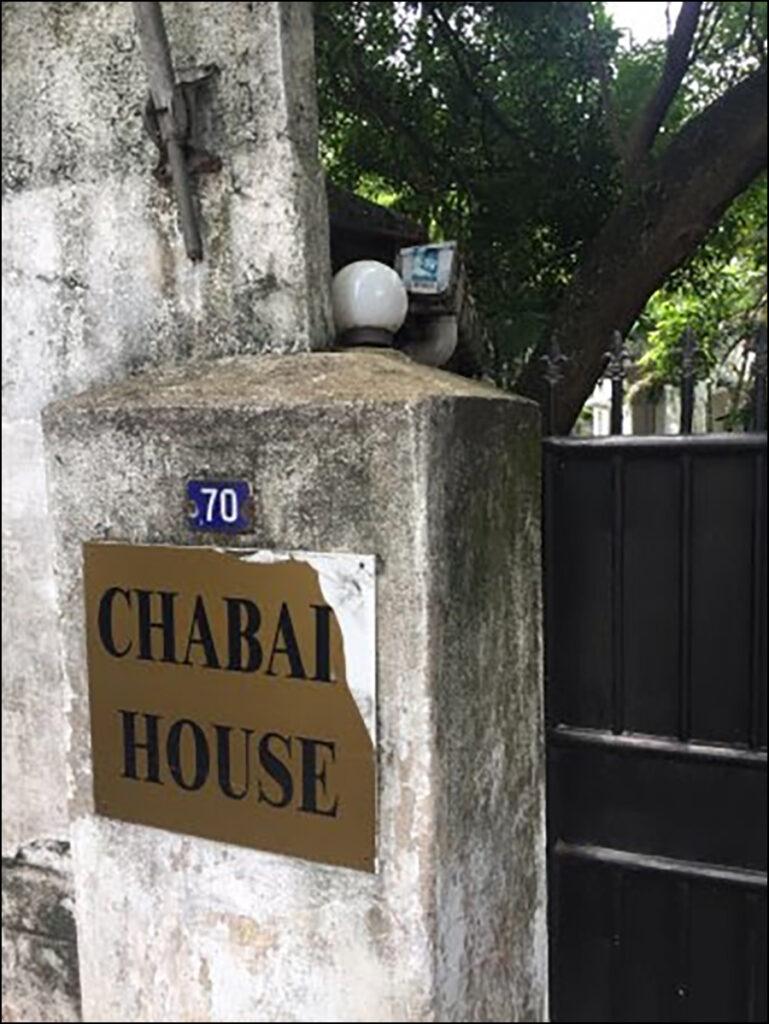
Added is the space provided by this NPP government for Israeli “tourists” to basically live here in Sri Lanka, with their own abodes and establishing cultural centres called “Chabad Houses”. It is rather puzzling how the NPP government could allow Israeli “tourists” to establish their cultural centres the government too accept as illegal, while providing armed police security for their safety. Presumably after a protest on the opposite pavement in front of the Chabad House in Kollupitiya on 09 May, a hurried announcement made by the Police Media Division on 11 May (2025) says, Israelis staying in Sri Lanka who have established Chabad Houses in some police divisions for their convenience, have been provided adequate security by those police divisions, due to threats to Chabad Houses. The police media division also says, if any foreign nationals staying in Sri Lanka needs security, SL Police would provide adequate security after an assessment on threats.
This NPP government’s foreign policy that officially provides SL labour for warring Israel and allows Israelis to “stay” in Sri Laka with State security, may in the future open Sri Lanka for “external” anti-Israeli threats as was discussed in many social forums over alleged ISIS links during the 2019 April Easter Sunday attacks that left 253 fatalities.
This possibility of destabilising Sri Lanka by external anti-Israeli agents, can only be counted by a principled change in foreign policy of the NPP government. With strong US support to stay within the IMF programme and with no alternate thinking, this government’s foreign policy can only be positively changed by rational social interventions by the Opposition that to date is totally absent. Sadly in Colombo, even the generally accepted educated, professional middleclass perception is wholly flawed. They claim they oppose genocide and stand in solidarity with Palestine, but have no demands for this NPP government to honour at least a viable ceasefire. No demand the NPP government should stop providing SL labour to Israel, heavily engaged in a brutal a war that to date has left over 55,000 Palestinians killed counting around 70 percent children and women, 180 journalists and over 224 humanitarian aid workers including 179 that worked for UN Relief and Works Agency (UNRWA).
If dollar remittances are all what matters to the NPP government, this NPP foreign policy of accommodating Israel, whose PM Benjamin Netanyahu and his former Defence Minister Yoav Gallant have arrest warrants issued by the International Criminal Court (ICC) for war crimes and crimes against humanity in Gaza, may invite threats to our national security, neither the NPP government nor the Opposition is willing to pay attention to.
– Kusal Perera
FEATURES
Indian scientists search for the perfect apple
Published
7 days agoon
June 13, 2025By
editor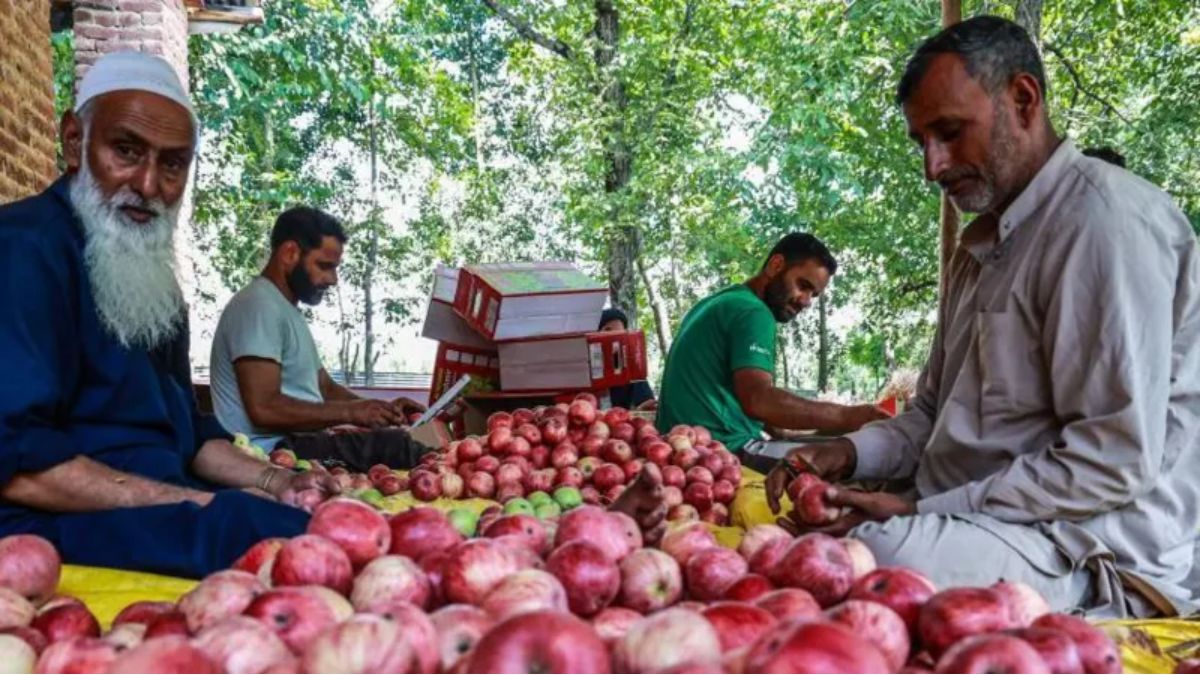
Jammu and Kashmir is India’s biggest apple producing region
“My neighbours thought I’d lost my mind,” says farmer Kakasaheb Sawant.
In 2022 he had decided to plant some apple trees, not crazy for a farmer unless, like Mr Sawant, you live in subtropical southern India, where temperatures can hit 43C.
He bought 100 saplings, of which 80 survived. Last year each tree produced between 30 and 40 kilogrammes of fruit.
“My farm has become something of a local miracle. People travel from far-off places just to see the apple trees growing under the hot Maharashtra sun.”
It’s not been an unqualified success though. One problem is that the apples are not sweet enough to sell.
Mr Sawant remains enthusiastic. He’s had some success selling apple tree saplings and is optimistic about future harvests.
“This is the beginning. The trees are getting acclimatised so according to me in next four to five years these trees will start bearing good, sweet apples.”
In his own small way, Mr Sawant is hoping to meet India’s rising demand for apples.
Production has risen 15% over the last five years to 2.5 million tonnes.
But that is not keeping up with demand and India’s imports have roughly doubled to 600,000 tonnes over the same period, according to S Chandrashekhar, who analyses India’s apple trade.
“We do have a shortage of apple production,” he says. “There are not many new players… at the same time, and there is no new investment.”
Essential for a good apple crop is a lengthy period of winter temperature between 0C and 6C.
Countries like the UK, with around 1,000 hours of this chill-time, can produce almost any apple variety.
But in India areas with those conditions are more limited.
Most of India’s apples come from two regions in the north of the country -Jammu and Kashmir and neighbouring Himachal Pradesh.
Mr Chandrashekhar says that many farms in those regions are becoming less productive.
“There are lot of old orchards producing fewer apples – that means the yield is coming down,” he says.
He says that climate change is making conditions less favourable.

Researches have grown apples in subtropical Ranchi, eastern India
In the hope of expanding apple production into new areas, some scientists and farmers are experimenting with so-called low-chill varieties.
Those are apple trees that can produce crops with around 400 hours of temperatures between 0C and 6C.
Ranchi, eastern India is also not an apple growing region – its subtropical climate is too hot.
But researchers at the Birsa Agricultural University (BAU) are testing 18 saplings of three low-chill varieties.
Success has been limited so far – only one of the varieties has produced any fruit.
“The plants have not reached optimal sizes. The tree has given us only around one to two kilogrammes of apples in 2024. I would not say that they are of best quality, but they were edible,” says Dr Majid Ali.
He says that as well as an unfavourable climate, the local soil is not ideal for apple trees and the trees get attacked by termites.
“This is an experimental stage. To reach a conclusion it would take three to four years to say if it is successful.”
He says that some local farmers have also been experimenting with low-chill apple varieties, also with little success.

India’s apple growers are struggling to keep up with demand
Some are sceptical that apples cultivated in hot areas will ever be a commercial proposition.
“The fruit that grows in non-traditional regions has a very short shelf life. The taste is not so sweet,” says Dr Dinesh Thakur, associate director of a regional horticulture research and training centre at Dr YS Parmar University of Horticulture and Forestry.
“These low-chill apples can be grown as novelty fruit in a kitchen garden, but their viability as a commercial crop is not proven… most of them are a failure,” he says.
Dr Thakur is based in the traditional northern apple growing region of Himachal Pradesh and his research focuses on the improvement of apples through breeding.
“Climatic change is creating havoc in apple cultivation,” he says.
He says the number of those crucial chilling hours are falling and due to erratic weather conditions farmers are facing colossal financial losses every year.
In search of better conditions, some orchards are being planted in higher locations, which were once considered too cold, he says.
Under a government sponsored project his team are experimenting with 300 varieties of apples, to assess the impact of climate change.
“We are also working on climate-resilient apple genotypes that can withstand the existing climate,” he says.
So far, they have developed an apple that matures with a ripe colour two months earlier than existing apple trees.
“This helps offset erratic weather patterns brought by climate change and has a quality advantage over those areas where colour formation is problem due to lack of sunlight,” Dr Thakur says.
“This is just the beginning of research to create climate resilient fruit and create a fruit that is acceptable to the Indian taste bud.”
For Mr Chandrashekhar, boosting India’s apple output will take more than just scientific work.
“Apple orchards in the traditional apple cultivation areas are 15 to 20 years old. What is needed is replanting of new saplings,” he says.
“The industry needs investment, huge investment. Who will do that?” he asks.
He would like to see the juice and jam business developed, to provide the industry with another source of income.
“That has to be a booster which can improve the apple economy and provide a better position for apple growers.”
– Priti Gupta
(BBC News)
FEATURES
NONE worried about massacre of the UN “Founding Charter”
Published
3 weeks agoon
June 2, 2025By
editor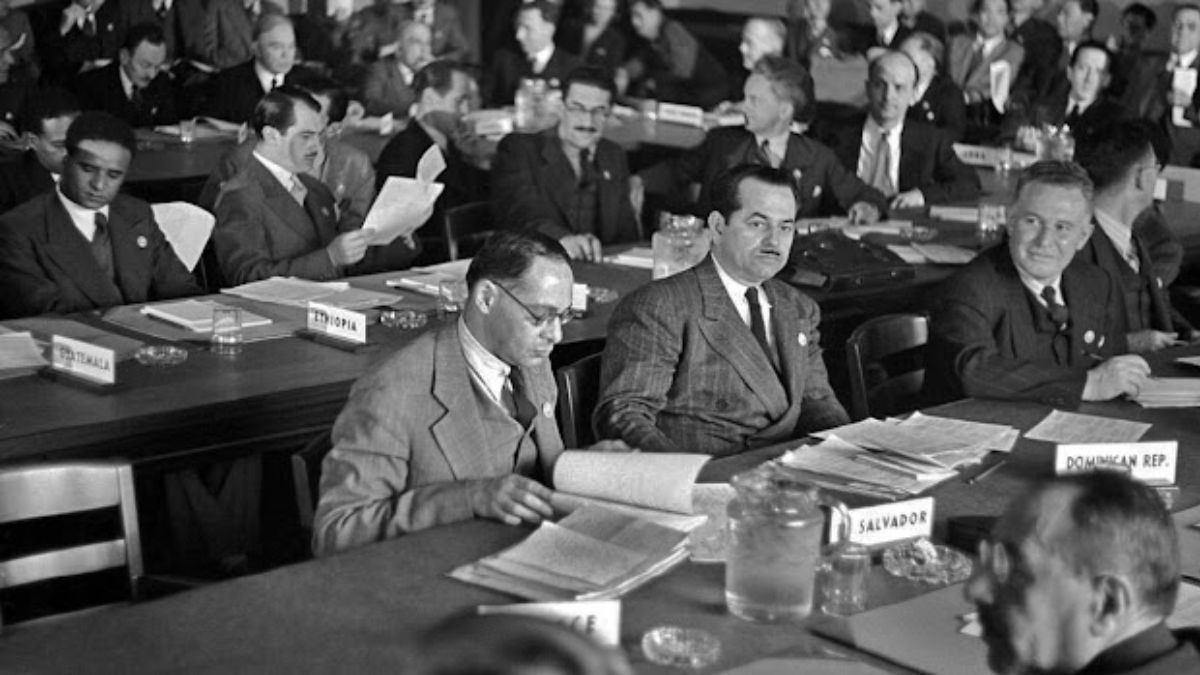
UN Founding Conference 1945 April 25 to June 26 – Courtesy UN Photos
Here is the opening pledge of the UN Charter on which the United Nations was officially declared established in October 1945 after WW II was brought to an end.
“We the People’s of the United Nations determined to save succeeding generations from the scourge of war, which twice in our lifetime has brought untold sorrow to mankind, and
to reaffirm faith in fundamental human rights, in the dignity and worth of the human person, in the equal rights of men and women and of nations large and small, and
to establish conditions under which justice and respect for the obligations arising from treaties and other sources of international law can be maintained, and to promote social progress and better standards of life in larger freedom…..”
This is the pledge the post WW II generations were given by all 193 member nations and they are all morally and internationally responsible to uphold it. Yet 05 years after the WW II and 05 years after the UN was formally announced, and when the world was less complex, the Korean war exploded in 1950 resulting in breaking up the country into North and South Koreas. When an end to the war was finally reached in 1953, Vietnam war was in the making.
How many member nations now stand firm against “the scourge of war” at least after the 20 year Vietnam war? Vietnam war left over 03 million casualties in a wholly devastated country at the end of the war in 1975, including 58,000 US soldiers dead and missing. (https://es.highpointnc.gov/2113/Vietnam-War#:~:text=More 20than%203%20million%20people,of%20U.S.%20forces%20in%201973)
After the Vietnam war, this is what global peace now means to the world citizenry.
The 20 year Afghan war with Soviet Russia (Russia after 1991) and the US both militarily involved, left 176,000 dead by 2021.
In Iraq, since the US invasion in 2003, the peer reviewed medical journal PLOS gives a figure of 460,000 deaths by June 2011.
Syrian war deaths given by the United Nations Human Rights Office (OHCHR) count “at least 306,887 civilians” by June 2022.

Syria the world’s largest refugee crisis since 2011, more than 14 million Syrians have been forced to flee their homes in search of safety. More than 7.4 million Syrians remain internally displaced, according to UNHCR (March 2025)
Russo-Ukrainian War include 14,200–14,400 military and civilian deaths during War in Donbas, and up to 1,000,000 estimated casualties during the Russian invasion of Ukraine till mid-September 2024. (Wall street journal)
Counted as the most brutal military onslaught let loose on human society post-WW II, the Israeli invasion of Gaza :-
Nearly 56,000 people (54,271 Palestinians and 1,706 Israelis) have been reported killed as of May 27, 2025 according to Gaza Health Ministry, as well as 180 journalists and media workers, 120 academics, and over 224 humanitarian aid workers, a number that includes 179 employees of UNRWA (UN Relief and Works Agency). OHCRH calculated 70% includes women and children.
All countries including the USA, UK, Germany, France, Canada, India, Italy, Serbia, Netherlands that supplied arms and ammunition to Israel especially after October 2023 are responsible for all fatalities and chaos in Gaza.
“Geneva Academy of International Humanitarian Law and HR” say they are monitoring armed conflicts In Mid-East and North Africa including in Cyprus, Egypt, Iraq, Israel, Libya, Morocco, Palestine, Syria, Turkey, Yemen and Western Sahara.
In Africa, they monitor armed conflicts in Burkina Faso where over 01 million is reported displaced, Cameroon, Central African Republic, DR of Congo, Ethiopia, Mali, Mozambique, Nigeria, Senegal, Somalia, South Sudan and Sudan.
In Asia it’s India, Pakistan, China, Myanmar, and Philippines.

Latin America has Mexico and Colombia.
Europe has Russo-Ukraine war, and Armenia.
Many more millions would add to the numbers above as casualties from armed conflicts in the continents mentioned therein.
What has the UN member nations being doing all these decades about the pledge they gave the post WW II new generations on world peace? For reaffirming faith in fundamental human rights, in the dignity and worth of the human person, in the equal rights of men and women and of nations large and small?
World citizenry, collectively and individually has to accept their irresponsibility in ignoring the UN Charter for a world without armed conflicts. They have not held their own nation States, their own political leaders responsible for world peace, for a world without armed conflicts as signatories to the UN Charter, all these decades in post WW II world.
They have not questioned the right of their nation State to continue accepting leading arms and weapons dealers and manufacturers as “permanent members of the Security Council” that’s mandated to establish world peace.
With 06 ongoing wars each accounting for over 10,000 deaths annually and 16 other armed conflicts with less casualties and refugees, World citizenry now has to demand dissolving of the present Security Council and to establish a “Committee for Disarmament and Peace” with member nations who are not in arms and weapons manufacture and trade. Today it’s about global disarmament for global peace. Rotated between countries within continents every 03 years, the Committee could have 07 permanent members representing the 06 continents with Asia given 02 to represent over 60% of the world population.
It would mean none of the top 50 arms exporting countries including India, South Korea, Japan, Sweden, Luxembourg, Poland, Turkey, Switzerland, Brazil, Morocco, and the present permanent members in the Security Council could sit in the proposed Committee for Disarmament and Peace.
Serious attention on global disarmament for peace is now necessary due to extension of armed conflicts lending to the concept of “National Security” that promotes arms, weapons and military equipment markets. National Security is essentially an ideological extension of “a would be war”, the market creator for weapons and military equipments through strengthening of national armed forces and intelligence agencies kept ready for war there isn’t. Ideologically groomed to have a constant ear for armed conflicts, and provoked to strengthen the State that ends up as repressive and anti democratic.
Thus arms trade, war and armed conflict is not a topic restricted to war torn countries alone and their immediate neighbors. It is a major topic for all UN members, who have pledged for world peace on the UN Charter. Global peace is about total disarmament across the globe and a world citizenry that insists on honoring the UN Charter.

– Kusal Perera
2025 June 01

Speaker endorses certificate on NTC (Amendment) Bill

Foreign Ministers of UK, France, Germany & Iran to meet








